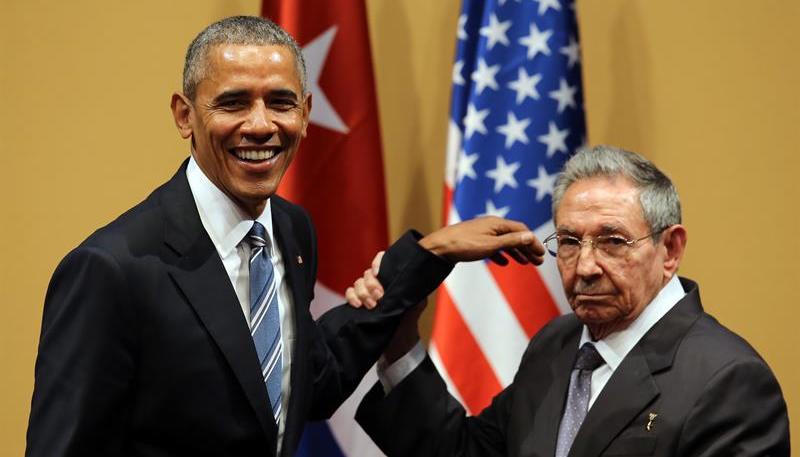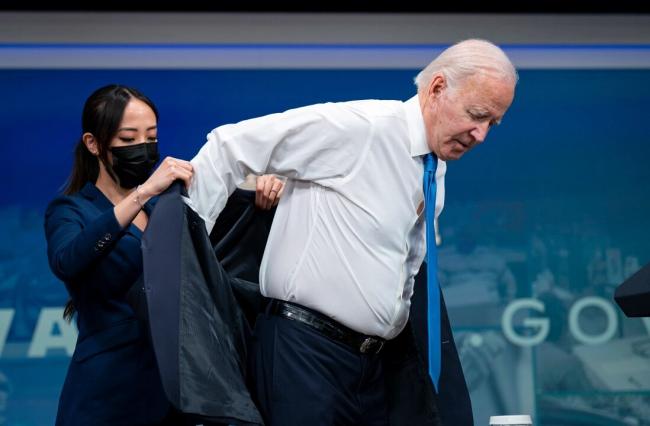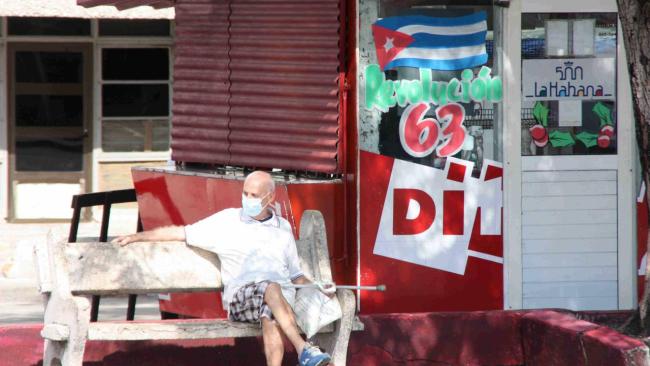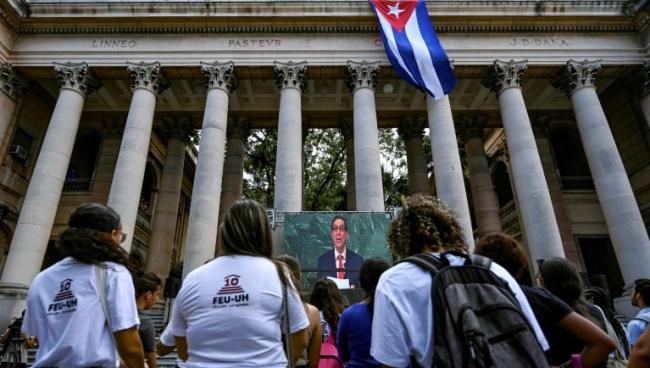Between October 11 and December 15, 2014, on the eve of the announcement of an agreement to reestablish diplomatic ties between the U.S. Government and Castroism, The New York Times published a series of seven editorials on relations between the two countries, employing language that surprised many for its echoing of traditional Castroist discourse. Those were times when Raúl Castro was portrayed as a reformer (there existing some reasons for this), while Fidel Castro was gasping for breath, trying to make himself heard through reflections published adopting the identity of just one more political supporter in the official press.
Some speculated then that The New York Times was seeking to influence the Obama Administration's policy. On December 17, 2014, just two days after the last of the editorials was published, with the surprise announcement of the start of a process to "normalize" bilateral relations, it became clear that, far from seeking to influence policy, the newspaper was actually outlining what was already in the works, in close collaboration with the U.S.’s architects of rapprochement.
The New York Times editorials called for lifting the embargo, praised Castro's efforts to send doctors to Africa to treat Ebola patients, and depicted Florida politics as a conflict between anti-Castroists, supporting sanctions, vs. those pushing in the opposite direction; according to the articles, the latter being better informed and free of resentment.
Those editorials were written by the Colombian-born journalist Ernesto Londoño, and Castroism was so delighted with them that during a visit to Cuba he was invited to the offices of the newspaper Granma, owned by the Communist Party and the country’s only daily, along with its counterpart put out by the Young Communist League (Unión de Jóvenes Comunistas).
Eight years later The New York Times published the article "Cuba faces its largest exodus as it grapples with the economic crisis," written by journalists Ed Augustin and Frances Robles. The rhetoric of the article immediately evoked that found in the editorials from 2014. If the Solomonic tone of the recent one is not as pronounced as in the old pieces, it is because it is possible for one to pretend that the circumstances to fill pages with nonsense remain identical, but the reality cannot be changed with them: today the one who is gasping for air is Raúl Castro, Fidel is six feet under, and nothing remains of that façade of a reformer that the mediocre general was able to build by promising, among many other things, a glass of milk, which never arrived.
If it is understood that the series of editorials in 2014 augured some of the areas that would immediately be addressed by the announcement of the reestablishment of diplomatic relations, the recent article allows us to assume that the U.S. Government is close to making changes to its migration policy with Cuba, but no more than that. There has long been talk of tougher conditions being imposed for our countrymen at the southern border of the United States, where more than 220,000 Cubans have arrived in one year. The article is right in stating that this is a problem for the Biden Administration, and a national security problem for the United States. The number is unprecedented in a country where, over the past 60 years, migration crises have become a constant, part of the country’s identity.
But it is not the references to the migrant crisis, and the accounts of some willing to undertake the crossing, even if the sea might take their lives, that underpin this article, but rather a description of the reasons why this migratory crisis is taking place, and its careful choice of words, in a way similar to the editorials of 2014, manifest a desire not to irk Cuba’s Castroist political leadership.
Looking back, while there may have been reasons for this in 2014, it is unacceptable for the authors of the recent article to put down the current crisis to the fact that "the country has been impacted by both tighter U.S. sanctions and the Covid-19 pandemic, which affected one of Cuba's vital areas."
One can understand the documentary and spiritual ignorance of a nation’s suffering shared by Ernesto Londoño, Ed Augustin and Frances Robles, but not the current ordeal, one of its symptoms being Cuba’s dire migration statistics, being described with such fallacies.
When talking about Cuba one cannot evade the fact that we have not had an economic model ever since Castroism stole and destroyed the country’s industrial, commercial and agricultural resources and infrastructure, starting in 1959. Devious and brutal, the Castroist elite stripped Cubans of all their wealth between 1959 and 1968. If talking about it is always relevant, it is because what the crisis today is nothing more than the fallout of this assault. There is no Cuban economic model. Rather there is a survival system, imposed with an iron fist, and it has collapsed. There is a Communist Party that favors its government figures over any citizen's yearnings, and none of this is the product of U.S. sanctions or Covid-19.
The authors of the recent article do not mention how Cubans have been cruelly barred from access to the currencies necessary to purchase essential goods like milk and meat. This story is almost as old as Castroism itself, but which had a new chapter in 2019, with the creation of "freely convertible currency" stores. Since then, only those who have cards previously charged with dollars and euros can buy food. Simultaneously, food dispensed in Cuban pesos was reduced, as well as the private channels for its acquisition, basically comprised of agricultural markets, imports from abroad and the black market.
What were Ed Augustin and Frances Robles looking at the week after July 11, 2021, when the Cuban government, frightened by the protests, suddenly decided to lift the price caps on agricultural products that had caused the shortages for two years, and opened up the importation of food and medicines from abroad, something we were clamoring for in the midst of a pandemic with pharmacies out of stock?
The authors reproduce the testimony of William M. LeoGrande, co-author of the book Back Channel to Cuba: The Hidden History of Negotiations between Washington and Havana. Castroism's enthusiasm with this text led it to publish a Cuban edition in 2016, two years after the English one. It states that Joe Biden has been slow to act against Trump's policies "for fear of triggering the anger of the community of Cuban exiles and provoking the wrath of Senator Robert Menendez, a powerful Cuban-American Democrat who chairs the Senate Foreign Relations Committee."
Again, the language in the article is amenable to the interests of Castroism, as the community of Cuban exiles is portrayed as a kind of angry gang, and not as a group of Cuban-Americans interested in the policies of their host country not belittling the suffering of their homeland.
Curiously, Robert Menendez was addressed in one of those 2014 editorials, which makes it clear that the senator is an effective obstacle for those who promote U.S. rapprochement with Castroism to the detriment of Cubans. It would be necessary to see if it was not the same LeoGrande —an academic and Democratic advisor, and a specialist in Latin America and Cuba, whose articles in The New York Times on Cuba date back to 1981, when he wrote "Getting Cuba," seeking to acquit the Cuban dictatorship as a "source" of subversion in El Salvador— who suggested to Londoño that derogatory enumeration of Cuban-American politicians in 2014.
Another person quoted in the article is Ben Rhodes, an essential figure in the negotiations prior to the reestablishment of diplomatic relations, who continues to promote Obama-style rapprochement, despite the fact that Castroism's false pretense of reform has long been revealed as a grotesque and cynical ruse. The official articulates a line of discourse that promotes reconciliation invoking humanitarian reasons, but what the intent is to empower American businessmen, enabling them to profit off the rations of our prisoners, the only assets of our lonely seniors, provided by their children abroad; and the shrouds of our martyrs, to whose list we recently added Elizabeth Meizoso, a two year old girl who disappeared at sea when a military vessel rammed the craft on which she and her mother were fleeing Cuba. The attack left seven dead.
The article states that "Cuba's freefall has been accelerated by the pandemic; in the last three years reserves have been reduced, and it has problems filling warehouses." But there is no mention of the dozens of luxury hotels constructed, under construction, and whose construction is slated in Cuba, a shocking spectacle that has filled the Havana cityscape with the sight of cranes, not seen for three decades, as brand-new hotels have been opened in a country lacking tourists. Many of these hotels were built during the pandemic without Cubans knowing where the financing came from, at a time when Castroism claimed it had no money to buy azithromycin, and the number of deaths soared, despite official statistics that did not reflect them.
Neither does the article mention the attacks suffered by U.S. diplomats on the island at the end of Obama's term of office; attacks described as ?acoustic,? but of such a diverse nature that they suggest disparate sources of damage. These attacks were also suffered by Canadian diplomats and were dismissed by local "specialists" as just a bunch of crickets chirping. The actions sought to sever relations between the United States and Castroism, and the truth is that this was the upshot, as Donald Trump's government withdrew its diplomats and the hand extended by Barack Obama's government.
There is an even less acceptable omission, however. In gathering the testimonies of Cubans preparing to leave the country, nowhere does freedom appear as an aspiration. In the article by Ed Augustin and Francis Robles, we Cubans seem to be a handful of unfortunate souls anxious to get our hands on the goose that lays the golden eggs, and not the representatives of a nation that time and again, in each of its demonstrations, due to the lack of medicine, electricity and food in their country, demands, as a priority, freedom.
Journalist Mónica Baró pointed to this in the following words in a debate with the author on her Facebook wall: "You focused the story on the embargo and the pandemic and did not publish a single word explaining the political causes of our crisis. This is a political crisis. And it is irresponsible to portray it as something else. A crisis that has caused much suffering among the Cuban people, and many deaths. A crisis that would not end if the embargo were lifted. It is deeper than that, but you did not dig deeper. It was your job to do that, and you didn't. You didn't even touch on July 11, or the political prisoners!"
Elaine Acosta, a Cuban intellectual consulted by the authors of the article and briefly quoted in it, told Mónica Baró: "An interview lasting more than half an hour, in which I think I was more than clear about the political responsibilities of the Cuban government for the structural crisis the Cuban society is enduring, and the political and economic exploitation of this exodus. And you find just a very brief quote about its effects on the reduction of the population. So, I don't think it's just a problem of consulting a few researchers..."
Those behind this article do a disservice to those who, in good faith, or being somewhat informed, actually believe that the reduction of U.S. sanctions would bring some good to the nation and that, sooner rather than later, it could break the criminal will of Castroism and reestablish democracy in Cuba.
Even worse, they ignore the mobilization of the Cuban people on and off the island, and that is a mistake that no U.S. administration can afford. There is no good reason today for Cubans to favor rapprochement with Castroism. Our prisons are overcrowded with fine citizens, and the whole population has been forced to emigrate because of the stranglehold of poverty on their hopes and futures.
Among those Cubans there are millions of Americans who, at the ballot box, will not forgive the abandonment of our aspirations, just as they have not ever since the 1960s; and not because of obstinacy, or because of an eagerness to repeat an obsolete line of discourse, but rather out of an incomparable and magnificent commitment to Cuba's freedom.



